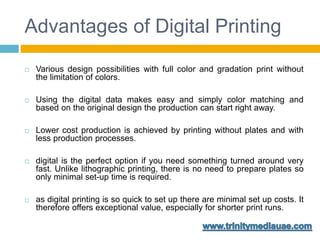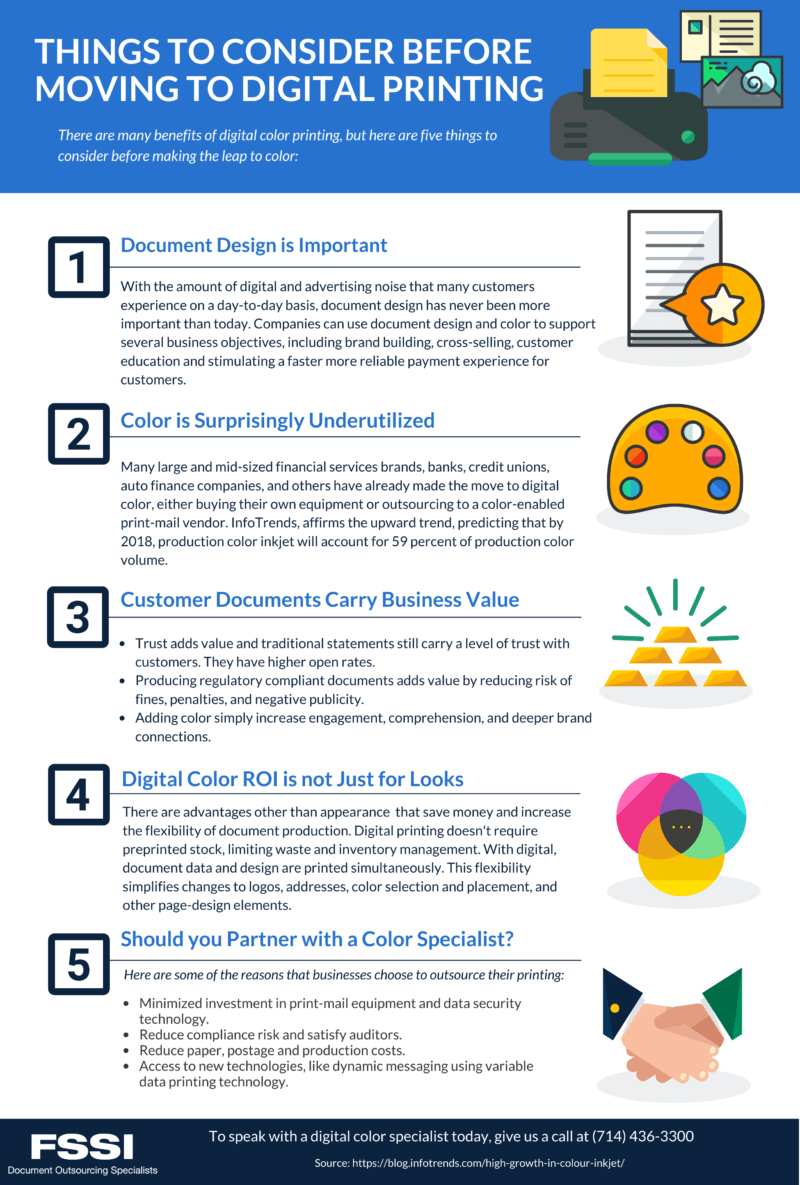Digital Printing for Dummies
Table of ContentsDigital Printing Can Be Fun For AnyoneSome Of Digital PrintingNot known Factual Statements About Digital Printing Our Digital Printing IdeasThe smart Trick of Digital Printing That Nobody is DiscussingSome Of Digital Printing
Variable information printing, such as straight mail with customized codes and addresses, is ideally fit for digital printing. Digital quick printing just requires 4 steps of design, evaluation, printing and binding to obtain whatever done. Digital quick printing has an exceptional benefit: print on need.According to PMMI, electronic printing allows brand names and manufacturers to react promptly to consumer demands while improving the supply chain, decreasing warehousing expense and waste, and taking pleasure in faster time to market. That all noises terrific, but how does this innovation do all that? The significant differentiator of these technologies is that there are no set-up costs and no plates with digital printing.
All about Digital Printing
According to Wikipedia, the best difference between digital printing and conventional techniques such as lithography, flexography, gravure, or letterpress - Digital Printing is that there is no need to change printing plates in digital printing, whereas in these analog printing techniques the plates are consistently replaced. This causes quicker turn-around time and reduces expense when utilizing digital printing.
Digital printing is highly adaptable, so it's simple to make changes to the package style promptly. It all goes back to the plates.
With conventional printing approaches, short-run printing is just not possible. Due to the fact that a wonderful design can make or damage your item, digital printing continually produces high-quality, clear and colorful graphics each time.
Digital printing is the process of printing digital-based pictures directly onto a range of media substratums. There is no demand for a printing plate, unlike with countered printing. Digital data such as PDFs or desktop posting files can be sent directly to the electronic printing machine to print theoretically, photo paper, canvas, fabric, synthetics, cardstock and other substratums.
Indicators on Digital Printing You Need To Know
According to PMMI, digital printing permits brands and manufacturers to react swiftly to client needs while improving the supply chain, reducing warehousing expense and waste, and enjoying faster time to market. That all audios excellent, yet just how does this modern technology do all that? The major differentiator of these modern technologies is that there are no set up costs and no plates with electronic printing.
According to Wikipedia, the best distinction between electronic printing and traditional methods such as lithography, flexography, gravure, or letterpress is that there is no need to replace printing plates in electronic printing, whereas in these analog printing methods the plates are consistently replaced. This leads to quicker turn-around time and lowers cost when making use of electronic printing.

Some Known Details About Digital Printing
With conventional printing techniques, short-run printing is simply not feasible. Since a fantastic layout can make or break your item, digital printing continually produces premium, clear and vivid graphics each time.

According to PMMI, electronic printing permits brand names and suppliers to react swiftly to consumer needs while improving official website the supply chain, decreasing warehousing price and waste, and delighting in faster time to market. That all noises great, yet just how does this technology do all that? The major differentiator of these modern technologies is that there are no set-up fees and no plates with digital printing.
Digital Printing - Questions
According to Wikipedia, the best distinction in between electronic printing and standard methods such as lithography, flexography, gravure, or letterpress is that there is no requirement to replace printing plates in digital printing, whereas in these analog printing techniques home plates are repetitively replaced. This causes quicker turn-around time and decreases price when making use of electronic printing.
Rapid manufacturing suggests obtaining your product to market faster. It likewise suggests it's easier and faster to make adjustments later on, when you transform a recipe, add a SKU, or produce seasonal packaging. Digital printing is very versatile, so it's simple to make changes to the bundle style rapidly. All of it returns to home plates.

Digital Printing Fundamentals Explained
Digital printing is the process of printing digital-based images directly onto a variety of media substratums. There is no need for a printing plate, unlike with offset printing. Digital files such as PDFs or desktop publishing documents can be sent straight to the electronic printing press to print on paper, photo paper, canvas, fabric, synthetics, cardstock and various other substratums.